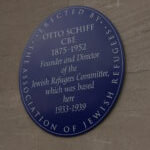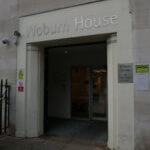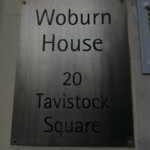AJR pays tribute to Otto Schiff
On Wednesday 18 December 2019 the AJR unveiled a commemorative plaque in honour of the founder, chair and director of the Jewish Refugees Committee (JRC), Otto M. Schiff C.B.E. at Woburn House, Tavistock Square in London which served as the Committee’s centre from 1933 to 1939. Many of the estimated 60,000 Jews from Germany and Austria who fled to Britain after 1933 – when Hitler acceded to power – received some form of assistance from the JRC, if only by registering with it at its seat in Woburn House. A number of dignitaries attended including: The Lord Sassoon, one of Schiff’s six great nieces and nephews, who were all present at the unveiling and The Rt Hon. the Lord Pickles, the Prime Minister’s Special Envoy for Post- Holocaust Issues.
Early life
Otto Schiff was born in 1875 in Frankfurt and was the nephew of banker Jacob Schiff. In 1896, at the age of twenty-one, he immigrated to London, where he became a partner in the merchant banking firm Bourke, Schiff and Co. His brother Ernst followed some time later. Together, in the First World War, the brothers ran shelters for Belgian refugees. For this work, Otto was awarded an OBE while his brother received an MBE.
Involvement with Jewish Refugees
He was appointed head of the Jewish Refugees Committee (JRC), which later became the German Jewish Aid Committee and today is known as World Jewish Relief, the UK Jewish community’s international humanitarian agency. From 1933, the Committee was responsible for making the organisational arrangements to bring Jews out of Germany and Austria to Britain, for supporting them financially once here, and for helping them to find accommodation and employment. Otto Schiff was instrumental in setting up the necessary support infrastructure to maintain the Jewish refugees from Nazism in Britain and received the CBE in recognition of his role at the JRC, which included supporting the child refugees who came on the Kindertransport.
Schiff had also been President of the Jews’ Temporary Shelter, which also assisted the Jewish refugees from Nazism. Following his death in 1952, Otto Schiff bequeathed his locally listed mansion, 14 Netherhall Gardens, as a Trust and care home for the benefit of the refugees of Nazi oppression.
Tributes to Otto Schiff
AJR Trustee Frank Harding, who devised the plaque scheme, said: “Otto Schiff was a tireless humanitarian who devoted much of his life to assisting refugees escaping oppression and war, but it is for his work at the Jewish Refugees committee that we are delighted to install this permanent recognition in his honour. Through our plaque scheme, we commemorate the lives of individual refugees and the people and places associated with them so that their contributions can be remembered in perpetuity.”
Rabbi Dr Leo Baeck, spiritual leader of the Jews from Germany, and for whom the AJR has also mounted a commemorative plaque, paid this tribute following Schiff’s death in 1952: “The name of Otto Schiff carried a special message in those years, when German Jews, who had helped others so often and so indefatigably, had to look round for help themselves in ever growing anguish. In those days we heard of the work which Otto Schiff undertook with such courage and such simplicity, the work for which he laid the foundations. We heard of faithful service, of a man who never tried to hide or give up, of an honest fight against evil, a resolution to do good, a will to help. This, too, was heroism at a time when many were timid and half-hearted. Such was the help, the message of hope, which the name of Otto Schiff contained even for those who lived far from the immediate sphere of his devoted service. We Jews from Germany will never forget Otto Schiff. Our heart-felt gratitude to him will remain part of our history.”
Werner Rosenstock, General Secretary of the Association of Jewish Refugees, 1941-82: “The AJR had the great privilege that since its inception it could rely on his counsel and his help. Only a year ago, when the work of the Jewish Refugees Committee had come to a close, it expressed the gratitude of the refugees to him in a hand-written address whose concluding words may now serve as an epitaph: “The labours which for almost two decades stood in the forefront of your thoughts and which enabled us to build up our lives anew, will never be forgotten by us.”’
Hans Reichmann, chairman of the Association of Jewish Refugees, 1954-63: “True to the great tradition of British Jewry to serve the cause of humanity, Otto Schiff took an active interest in the Dockland settlement and was at the same time the chairman of the Jews’ Temporary Shelter in the East End of London. This Shelter, though only for a few weeks, became the headquarters of the Jewish Refugees Committee, the Committee established by Otto Schiff and other high-minded British Jews to assist German Jewry in the years of their direst need. Day by day Otto Schiff would leave his own affairs and would spend the whole afternoon at Woburn House, untiringly listening to the “cases”. And behind every case there was a human tragedy. He did not shun being confronted with these broken reeds of humanity, listening in person to the distressing details. And again and again he would plead cases with the authorities whose confidence he enjoyed.”















